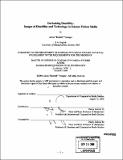Decloaking disability : images of disability and technology in science fiction media
Author(s)
Verlager, Alicia
DownloadFull printable version (7.251Mb)
Other Contributors
Massachusetts Institute of Technology. Dept. of Comparative Media Studies.
Advisor
Henry Jenkins, III.
Terms of use
Metadata
Show full item recordAbstract
This work examines how images of disability are used to frame cultural narratives regarding technology. As advances in biotechnology ensure that more people will be living with technological prosthetics against and beneath their skin, there is an increasing importance in examining how such bodies challenge traditional cultural attitudes regarding identity and non-normative bodies. This work uses a cultural studies approach to explore the intersections between disability and technology. Additionally, memoir is often included to illustrate some of the complexities regarding how experiences with disability and technological prosthetics can influence aspects of identity. Like disability, technology is often framed in gothic terms of lack or excess, and thus a discussion of the "techno-gothic" also features in this work. Furthermore, such a discussion is also relevant to seemingly unrelated modes of characterizing the other, such as the archetype of the cyborg, the queer body, or the formation of non-traditional social groups, even to images of the city as urban ruin. (cont.) This work demonstrates that, while images of disability rarely inform us about the everyday experience of disability, they can inform us about how technology frames non-normative bodies as either "less than" or "more than" human, and how the tropes and language associated with disability is often used to characterize technology itself.
Description
Thesis (S.M.)--Massachusetts Institute of Technology, Dept. of Comparative Media Studies, 2006. Includes bibliographical references.
Date issued
2006Department
Massachusetts Institute of Technology. Program in Comparative Media Studies/WritingPublisher
Massachusetts Institute of Technology
Keywords
Comparative Media Studies.